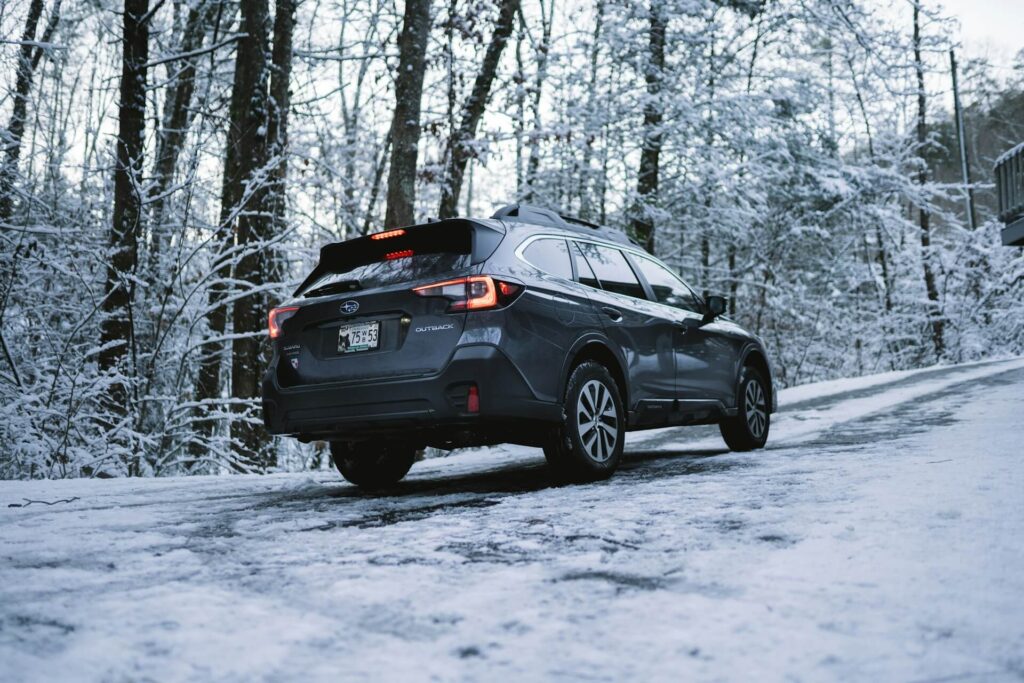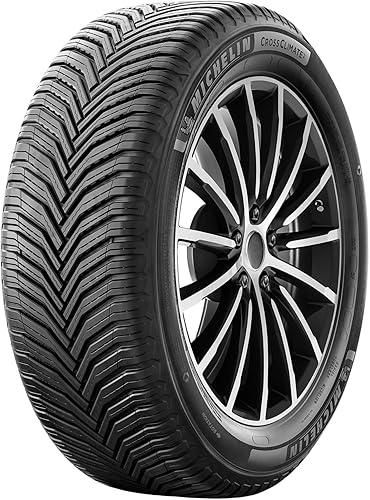If you’re gearing up your Subaru Outback for everything from rainy commutes and highway cruising to light off-road adventures, choosing the right set of tyres is key. Our upcoming list showcases the five best tyre options built for the Outback’s combination of comfort, all-wheel drive capability and versatile usage. After reviewing performance, durability and value, our top recommendation is the Michelin CrossClimate 2 — it consistently earns praise for its all-season reliability (including light snow), strong wet/dry traction and longer-than-average tread life, making it an ideal match for a vehicle like the Outback.
Best 5 Tires for Subaru Outback
01. Goodyear Assurance Finesse All-Season Tire
The Goodyear Assurance Finesse All-Season Tire stands out as a solid option for drivers who need dependable performance throughout the year. Designed for sedans, crossovers, and small SUVs, this tire focuses on balanced comfort and traction without overhyping itself. The tread pattern channels water efficiently, reducing hydroplaning risk while maintaining a quiet and steady feel on both dry and wet roads. Many drivers prefer this tire for its consistent grip and smooth handling, especially when the temperature shifts between seasons.
✅ Pros:
- Reliable traction in both wet and dry road conditions
- Quiet and comfortable highway driving experience
- Long-lasting tread with even wear pattern
- Backed by Goodyear’s trusted warranty and durability
❌ Cons:
- Not ideal for extreme winter or icy conditions
- Slightly higher price compared to budget all-season models
For those searching best all-season tire for Toyota RAV4, Subaru Outback, Honda CR-V, or Ford Explorer, the Goodyear Assurance Finesse often appears as a top pick due to its mix of performance and ride comfort—making it a smart, steady investment for everyday commuters.
02. MICHELIN CrossClimate2, All-Season Car Tire
The MICHELIN CrossClimate2 All-Season Tire is a solid choice if you need reliable traction through unpredictable weather. Its V-shaped tread pattern grips well on dry pavement yet still handles rain or light snow without losing control. Many drivers like that it offers a quiet, comfortable ride even after thousands of miles. Designed for sedans, crossovers, and small SUVs, it’s known for its strong wet-braking performance and energy-efficient rubber compound that improves fuel mileage on long drives.
✅ Pros:
- Excellent all-season grip on both dry and wet roads
- Shorter braking distance compared to many competitors
- Long tread life and strong durability
- Smooth, quiet ride even at highway speeds
❌ Cons:
- Slightly higher price point
- Not ideal for heavy snow or deep-winter conditions
This tire is often recommended for vehicles like the Toyota RAV4, Subaru Outback, Honda Accord, and Ford Explorer, where year-round balance between performance, safety, and comfort really matters. It blends touring comfort with all-season reliability, making the MICHELIN CrossClimate2 a dependable pick for drivers who hate switching tires every season.
03. Bridgestone Turanza QuietTrack All-Season Touring Tire
The Bridgestone Turanza QuietTrack All-Season Touring Tire is built for drivers who want that quiet, comfortable ride without trading off long tread life or grip. This tire is designed for sedans, coupes, and crossovers—cars like the Toyota RAV4, Honda Accord, Subaru Outback and Ford Explorer fit right in its lane. The tread pattern uses Bridgestone’s QuietTrack technology, which helps reduce road noise while maintaining strong wet and dry traction. It grips well on light snow too, making it a solid pick for year-round use. With its 80,000-mile treadwear warranty, you’re getting durability that outlasts many in the touring tire category.
✅ Pros:
- Remarkably quiet on highways due to QuietTrack Technology
- Great traction in both wet and dry conditions
- Long tread life with up to 80,000 miles warranty
- Comfortable ride even on rough asphalt
❌ Cons:
- Slightly higher price than average all-season tires
- Not ideal for deep snow or off-road surfaces
Drivers looking for consistent grip, longevity, and comfort will find the Bridgestone Turanza QuietTrack among the best all-season touring tires on the market.
04. Yokohama Geolandar AT G015 205/70R15 96H Tire
The Yokohama Geolandar AT G015 205/70R15 96H Tire is built for drivers who switch between rough terrains and everyday roads without missing a beat. Designed with Yokohama’s EnduroCore construction, it offers long tread life, dependable traction, and surprisingly smooth highway manners for an all-terrain tire. Whether mounted on an SUV or a light truck, it handles rain, gravel, and light snow with steady grip, making it a solid pick for those who live around mixed driving conditions. Its aggressive shoulder blocks help bite into loose soil, while the optimized tread compound improves wet braking and reduces noise over asphalt.
✅ Pros:
- Excellent all-season performance including wet and light snow traction
- Reinforced sidewalls add durability for off-road use
- Quieter than many other all-terrain tires on highways
- Long treadwear warranty from Yokohama
❌ Cons:
- Slightly firmer ride on smooth city roads
- Fuel efficiency drops a bit compared to touring tires
This Yokohama Geolandar AT G015 fits perfectly for drivers seeking a balance between off-road adventure and daily comfort. Compatible with vehicles like the Toyota RAV4, Subaru Outback, Honda CR-V, and Subaru Forester, it’s among the more reliable all-terrain tires under the 205/70R15 size range.
05. Falken Wildpeak A/T Trail 225/65R17 102H All Terrain Light Truck Tire
The Falken Wildpeak A/T Trail 225/65R17 102H All Terrain Light Truck Tire blends the grip of a rugged off-road tire with the refinement of an all-season touring tire — perfect for crossovers and light trucks that need to perform year-round. Its silica-enriched tread compound grips strong on wet pavement and loose gravel alike, while the 3D Canyon Sipe Technology helps reduce wear during aggressive cornering. Built with Falken’s trusted Outer Apex Sidewall, it holds steady on uneven terrain and resists punctures better than standard all-season tires. Many Toyota RAV4 and Subaru Outback owners choose this tire because it doesn’t whine on highways but still bites hard on dirt or snow.
✅ Pros:
- Strong traction on snow, mud, and wet surfaces
- Quiet and comfortable highway ride
- Excellent tread life with even wear
- 65,000-mile limited warranty
❌ Cons:
- Slightly firmer ride on city roads
- Can lose some fuel efficiency compared to highway tires
If you’re looking for a tire that handles both urban commutes and weekend trail runs without compromise, the Falken Wildpeak A/T Trail sits right at that sweet middle ground. It’s built for drivers who want all-terrain confidence but don’t want to hear it humming at every stoplight.
How to Choose the Best Tires for Subaru Outback
There’s something oddly personal about tires. You don’t realize it until you’re driving your Subaru Outback down a cracked highway, the wind pushing sideways, and you suddenly feel that faint vibration under your feet. That’s when it hits you—those four circles of rubber decide everything. The way the car hugs a wet corner, the silence on long road trips, the confidence when snow tries to ruin your morning. So, yeah, picking tires isn’t just shopping—it’s more like matchmaking.
The Subaru Outback Personality
The Outback isn’t flashy. It’s practical in that quiet, outdoorsy way. You can load it with groceries one day and camping gear the next. But that versatility means the tires have to be equally flexible. Subaru gives it AWD (all-wheel drive), sure, but that system is only as good as the traction it gets. Many owners swear by all-season tires, saying they’re “good enough.” And maybe they are. But “good enough” sometimes becomes “barely adequate” when the rain hits or the road turns to gravel.
Now, if you’re living in a place that sees snow for six months, all-season might actually mean “all disappointment.” Statistically, winter tires can improve braking on icy roads by over 25%, even at modest speeds. That’s not marketing—it’s friction, plain physics.
All-Season Tires
They’re like that friend who’s decent at everything but not amazing at anything. All-season tires for the Subaru Outback are built for those who spend 90% of their time on paved roads. They handle mild winters, wet highways, and dry summers with a kind of bland competence. The tread pattern tends to be symmetrical, with moderate siping for water evacuation. You’ll find models like Michelin CrossClimate 2, Continental TrueContact Tour, or Falken Ziex CT60 A/S often topping user reviews.
The catch? They harden when temperatures drop below freezing. That means longer braking distances and less control when things get icy. But for commuters in places like Oregon, Virginia, or North Carolina, they’re a safe bet. Not perfect, but predictable.
All-Terrain Tires: When Curiosity Meets Mud
If you’ve ever looked at your Outback and thought, “Yeah, I can take that trail,” you’re the reason all-terrain tires exist. They look aggressive, tread blocks chunkier, sidewalls reinforced. These aren’t for the mall-parking crowd. The Falken Wildpeak A/T Trail is a favorite among Outback owners because it’s actually designed for crossovers, not full-size trucks.
Here’s a little data—Falken’s internal testing showed a 20% improvement in gravel traction and puncture resistance compared to standard touring tires. You’ll feel the difference on forest roads, that grippy sensation when the car stops slipping and just… climbs.
Downside? Noise. Oh, and fuel economy. You’ll lose a couple miles per gallon. But for many, the trade-off’s worth it.
Touring Tires
There’s something to be said for silence. If you mostly drive on highways, touring tires make the Subaru Outback glide smoother. The rubber compounds are softer, and the tread blocks smaller, which cuts down on road hum. Think of them as the polite tires—they don’t argue with the asphalt.
The Bridgestone Turanza QuietTrack and Michelin Defender2 are good examples. They have treadwear warranties crossing 70,000 miles, sometimes more. That’s nearly the lifespan of some people’s relationships. But keep in mind, that longevity depends heavily on alignment and rotation. Miss those, and your tire edges will wear out like cheap shoes.
Winter Tires
Snow changes everything. You can have the best AWD system on Earth, but with the wrong tires, it’s like running in socks. Winter tires use softer rubber that stays flexible in freezing temps. They also have deeper grooves and more biting edges—engineered chaos, you could say.
Statistically, a vehicle equipped with proper winter tires stops about 30-40% shorter on icy pavement than one using all-seasons. That could mean the difference between a safe stop or an insurance call. Popular options like Bridgestone Blizzak WS90 or Nokian Hakkapeliitta R5 are often recommended for Outback drivers in snowy regions.
The drawback? They wear out faster in warm weather. So, if you go that route, plan for two sets—winter and summer. It’s a pain, yes. But so is sliding sideways down a hill.
Size and Fitment Confusion
Subaru Outbacks often come with 225/65R17 or 225/60R18 tires depending on trim. Some people upgrade for aesthetics or performance, but not every size swap is smart. A wider tire can look cooler, sure, but it might rub the wheel well or mess with your speedometer calibration.
Here’s a rule of thumb: the rolling diameter difference shouldn’t exceed 3%. If it does, you’ll throw off your ABS and stability control. It’s not worth the gamble.
When Cheap Becomes Expensive
It’s tempting to grab the lowest-priced tire online, but you’ll regret it faster than a bad haircut. Tires affect braking distance, fuel economy, even steering feel. A Consumer Reports test once showed premium tires stopping up to 25 feet shorter than budget ones from 60 mph. That’s roughly two car lengths. Imagine that difference in an emergency stop.
Good tires are an investment in not rear-ending someone. Simple as that.
What You Should Actually Do
If you’re the type who drives mainly on pavement, go with high-quality all-season touring tires. They’re the best mix of comfort, durability, and price. For light off-roading or mixed terrain, all-terrain tires like the Wildpeak A/T Trail or Continental TerrainContact A/T will serve you well. And if you live where winters bite hard—no debate—get dedicated snow tires.
Rotate them every 6,000–8,000 miles, check pressure monthly, and don’t forget alignment once a year.
Final Thought (If There Even Is One)
Choosing the right tire for your Subaru Outback isn’t about brand loyalty or aesthetics. It’s about how you live. Long commutes? Mountain trips? Snowy mornings? The best tire is the one that matches your habits, not your dreams.
Sometimes the smartest upgrade isn’t the fancy roof rack or LED bar—it’s the quiet, round things holding the whole story together.






